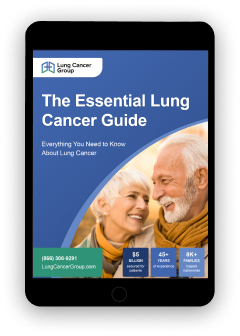Stage 2 Lung Cancer
In stage 2 lung cancer, tumors have started to spread and are more extensive than in stage 1 — but treatment options like surgery can still help patients live longer. Learn more about lung cancer stage 2, how it’s treated, and how to access compensation for medical bills.
What Is Stage 2 Lung Cancer?
A person may have stage 2 lung cancer if doctors see that a tumor has started to spread within the lung.

Stage 2 tumors develop in or around the bronchi (tubes that carry air into the lungs) and may partially block airways, according to the American Cancer Society (ACS). The cancer may also reach nearby lymph nodes.
However, the tumors haven’t spread very far, meaning doctors can often effectively treat this lung cancer stage. Many patients have a good long-term prognosis (health outlook) as a result.
Lung cancer stage 2 treatments can be expensive, but we may be able to help you secure the money needed to afford them. Get our Free Lung Cancer Guide to learn about treatments and compensation options.

- Understand risk factors
- Find top treatments
- Pursue compensation



Stage 2 NSCLC vs. Stage 2 SCLC
Only cases of non-small cell lung cancer (NSCLC) can be classified as stage 2 under the Tumor-Node-Metastasis (TNM) stage system. This system widely used to stage many cancers.
Small cell lung cancer doesn’t follow the TNM system. If the cancer hasn’t spread far, doctors will informally classify it as limited stage. This is the equivalent of a stage 1 or 2 NSCLC diagnosis.
Stage 2A Lung Cancer
NSCLC has two substages: 2A and 2B. In Stage 2A, the tumor is between 4 and 5 centimeters and is contained within lung tissue.
Stage 2B Lung Cancer
In stage 2B, the lung cancer tumor is 5 centimeters or less in size, but it has spread to nearby lymph nodes. Cancer uses lymph nodes to spread through the body.
Stage 2 Lung Cancer Symptoms
Symptoms of stage 2 lung cancer are similar to those of stage 1. They are typically mild and could be mistaken for less serious health problems like asthma or the flu.
- Bloody mucus when coughing
- Chronic cough that worsens over time
- Constant chest pain
- Hoarseness
- Lung infections
- Shortness of breath
- Weight loss
Moffitt Cancer Center notes that some lung cancer stage 2 patients may not have any symptoms. This is because symptoms typically appear as the cancer worsens in later stages.
Diagnosing Lung Cancer Stage 2
See a doctor as soon as possible if you suffer from any potential stage 2 lung cancer symptoms. They will perform tests to rule out or confirm a lung cancer diagnosis.
Diagnostic tests for lung cancer include:
- A physical examination to assess symptoms
- Imaging scans (X-ray, PET scan, CT scan) to look for signs of cancer
- A biopsy to check a fluid or tissue sample for cancerous cells
“One piece of advice I would like to share with others is to always follow your instincts. My gut was telling me that something wasn’t right in my body.”
— Samantha, stage 2 lung cancer survivor
If doctors confirm you have lung cancer, they can look at your imaging scans to see how far the cancer has spread and determine your stage.
Diagnosed with stage 2 lung cancer? Contact us to find out if we can help you seek compensation for treatment costs.
Stage 2 Lung Cancer Treatment
Doctors can use surgery, chemotherapy, immunotherapy, targeted therapy, and radiation to treat lung cancer stage 2 so patients can live longer. Learn about top stage 2 lung cancer treatments below.
Surgery
According to the Memorial Sloan Kettering Cancer Center, stage 2 lung cancer is typically treated with surgery. Since a stage 2 tumor is just in the lung and sometimes nearby lymph nodes, doctors can surgically remove all or most of it.
Lung cancer surgeries for stage 2 patients include:
- Lobectomy involves removing the lung lobe where the tumor is located.
- Sleeve resection removes a lobe, part of the bronchus (large airway tube), and as much of the cancer as possible.
- Pneumonectomy allows doctors to take out the whole lung.
After surgery, your doctors may prescribe follow-up (adjuvant) treatments like chemotherapy, immunotherapy, or radiation. These can kill microscopic cancer cells that may have been left behind.
Get our Free Lung Cancer Guide to learn how surgeries and other treatments can help you after a stage 2 lung cancer diagnosis.



- Understand risk factors
- Find top treatments
- Pursue compensation



Chemotherapy
Chemotherapy drugs are powerful chemicals that kill fast-growing lung cancer cells.
Doctors can use lung cancer chemotherapy as:
- The initial treatment: Doctors can use neoadjuvant chemotherapy to shrink tumors, making them easier to remove through surgery.
- The main treatment: Chemotherapy is sometimes used to get rid of all stage 2 lung cancer tumors and prevent the cancer from recurring (coming back).
- Follow-up treatment: Adjuvant chemotherapy can destroy lung cancer cells left behind after radiation or surgery.
- Palliative (pain-relieving) care: Palliative chemotherapy can ease lung cancer stage 2 symptoms and improve quality of life.
Your lung cancer doctor can determine the best way to use chemotherapy in your case.
Immunotherapy
Immunotherapy boosts the body’s immune system to help it find and destroy lung cancer cells.
Lung cancer stage 2 immunotherapy treatments include:
- Immune checkpoint inhibitors prevent cancer cells from activating immune checkpoints to hide from T-cells (which the body uses to kill cancer).
- T-cell therapy uses modified T-cells to kill lung cancer cells.
- Oncolytic virus therapy uses viruses modified in a lab to eliminate cancer cells.
When used before surgery, immunotherapy helped many stage 2 and stage 3 NSCLC patients live longer, as noted in a 2022 Cancers report.
Call (877) 446-5767 for more information about stage 2 lung cancer treatments and how to afford them.
Radiation Therapy
Also known as radiotherapy, this uses high-powered beams of energy (such as X-rays) to kill cancer cells.
Doctors may use radiation therapy to treat stage 2 NSCLC if surgery isn’t an option, according to the National Cancer Institute (NCI). It can also be used after other stage 2 lung cancer treatment options like surgery to kill leftover cells.
“I was referred to a cancer clinic where I underwent four radiation treatments. The tumor has since shrunk, and there is just scar tissue left, making me a survivor!”
— Carol, Stage 2 lung cancer survivor
Targeted Therapy
Targeted therapy treats lung cancer stage 2 by attacking specific proteins and genes to limit cancer spread.
Common types of targeted therapy are:
- EGFR inhibitors like Tagrisso® (osimertinib) target the protein EGFR, which lung cancer cells use to grow faster than normal cells.
- KRAS inhibitors prevent lung cancer tumors from using the KRAS protein, which would otherwise allow them to spread.
Many targeted lung cancer therapies are available in clinical trials, which help patients access emerging treatments in carefully created research studies.
Stage 2 Lung Cancer Prognosis
Generally speaking, stage 2 lung cancer prognosis is favorable, with many patients becoming long-term survivors.
Lung cancer stage 2 patients may live longer if they:
- Are otherwise healthy
- Are young or middle-aged
- Get multimodal therapy (where several treatments are used)
- Have NSCLC, since SCLC grows and spreads faster
Learn how doctors measure stage 2 lung cancer prognosis below.
Stage 2 Lung Cancer Life Expectancy
Life expectancy measures the average survival time of patients.
The stage 2 lung cancer life expectancy with treatment ranges between 56.2 and 59.9 months, according to a 2023 study published in Journal of Clinical Oncology.
Some patients can even become long-term lung cancer survivors, depending on how their body responds to treatment. For example, Masako was diagnosed with stage 2 NSCLC in 2013 but will celebrate 12 years of survivorship in 2025.
Stage 2 Lung Cancer Survival Rate
Survival rate is the number of patients still alive a set period of time after a diagnosis.
Stage 2 lung patients who get treatment have a 5-year survival rate of 50-60%, according to Roswell Park Comprehensive Cancer Center.
Lung cancer survival rates vary depending on factors like your age, health, and treatments used. Talk to your oncology (cancer) doctor to get a better idea of your projected survival rate.
Get Help for a Stage 2 Lung Cancer Diagnosis
While a stage 2 lung cancer diagnosis can be very concerning, it’s important to stay hopeful. Getting treatment can allow you or a loved one to potentially survive this cancer and ease your symptoms.
In many cases, doctors can remove most or all of a stage 2 lung cancer tumor, increasing your odds of becoming a long-term survivor.
“With lung cancer, as with any cancer, you go through the initial stages of shock and grief. But I have accepted this obstacle, and I am optimistic and prepared to fight my way back to health.”
— Helen, stage 2 lung cancer patient
Lung Cancer Group can walk with you through a stage 2 lung cancer diagnosis. Call (877) 446-5767 or get a Free Lung Cancer Guide now to explore treatments and compensation options.
Stage 2 Lung Cancer FAQs
Is stage 2 lung cancer curable?
Potentially, yes. While there’s not a universal cure for lung cancer, doctors may consider individual patients “cured” if they can destroy all of the tumor. This is possible in many cases of stage 2 lung cancer.
“The patients that we have the most chance to cure are those with the earliest or less advanced lung cancers,” said Dr. Seth Force, a lung cancer surgeon at Emory Winship Cancer Institute. “Early-stage lung cancers would be considered stages 1 and 2.”
Is stage 2 lung cancer considered early?
Yes, stage 2 lung cancer is considered early. While it has spread further than stage 1, doctors can still often destroy a stage 2 tumor using different treatments. This may allow patients to live longer.
What is the treatment for stage 2 lung cancer?
The best treatment for stage 2 lung cancer for many patients is surgery. Doctors can often remove all of a lung tumor using surgery. Other treatments, like chemotherapy and radiation, can also help stage 2 lung cancer patients.
Contact our team now for more information about treatments for stage 2 lung cancer and how to afford them.
What is the recovery time for stage 2 lung cancer surgery?
How long it will take to recover from a stage 2 lung cancer surgery varies. Patients who undergo video-assisted surgery may only spend 1-3 days in the hospital before going home, according to University of Missouri Health Care.
More aggressive surgeries for stage 2 lung cancer may take longer to recover from. Your doctor can give you a better idea of how long your recovery will take.
How serious is stage 2 lung cancer?
Stage 2 lung cancer is very serious — you’ll need to get treatment if you want to become a long-term survivor. Without treatment, your cancer will worsen to a later and more aggressive stage.
Our team may be able to help you afford lung cancer treatments. Call (877) 446-5767 to learn more.
Is stage 2 lung cancer a death sentence?
No, stage 2 lung cancer is not necessarily a death sentence. Doctors can effectively treat many patients with surgery and other therapies.
While there are no guarantees, you have a better chance of becoming a long-term survivor in this stage compared to stage 3 or stage 4 lung cancer patients.

